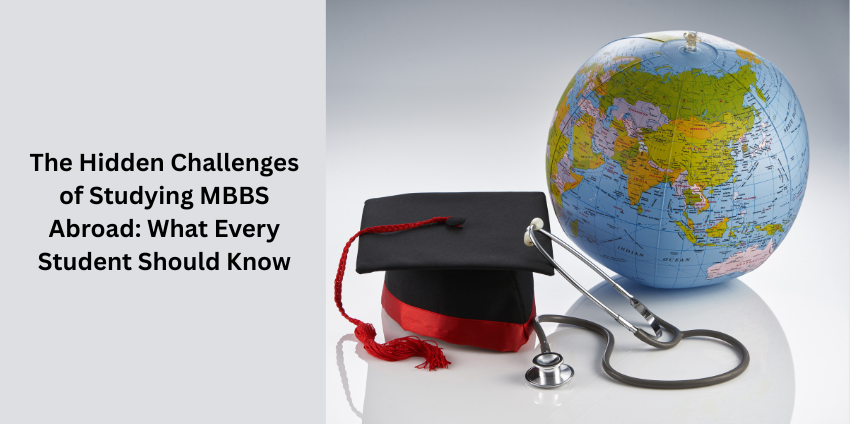


Studying MBBS abroad is a dream for many Indian students. With affordable tuition fees, globally recognized degrees, and high-quality education, it offers a great alternative to the limited medical seats in India. However, while the benefits are many, students often face unexpected challenges during their journey.
From cultural adaptation to licensing exams, navigating MBBS abroad isn’t always smooth. This blog highlights the hidden challenges of studying MBBS abroad and provides solutions to help students overcome them.
One of the most common challenges Indian students face while studying MBBS abroad is the language barrier.
Some universities offer MBBS programs in English, but daily communication with patients, local communities, and faculty might require knowledge of the local language.
Difficulty in understanding medical terminologies in a foreign accent can make learning challenging.
Choose a university that offers an MBBS program entirely in English.
Enroll in basic language courses before moving abroad.
Use language-learning apps like Duolingo or practice with native speakers.
Adjusting to a new culture can be overwhelming, especially for students who have never traveled abroad.
Differences in food, lifestyle, and social norms.
Missing family and friends, leading to homesickness.
Struggling to fit in due to different religious or social customs.
Connect with Indian student communities in the country.
Maintain regular communication with family via video calls.
Stay open-minded and embrace cultural differences as a learning experience.
Even though studying MBBS abroad is more affordable than private medical colleges in India, students still face financial struggles.
Living expenses, including accommodation, food, and travel, add up.
Unexpected costs like visa renewals, medical insurance, and exam fees.
Currency fluctuations can impact the budget.
Plan your budget before moving abroad.
Look for part-time work opportunities if allowed by the country.
Apply for scholarships and financial aid where possible.
Completing MBBS abroad doesn’t automatically qualify students to practice in India.
Foreign Medical Graduates (FMGs) must pass the Foreign Medical Graduate Examination (FMGE) or National Exit Test (NExT) to practice in India.
The FMGE pass percentage is relatively low, making it crucial for students to prepare well.
Some universities do not meet the Medical Council of India (MCI) standards, making graduates ineligible to practice in India.
Choose an MCI/NMC-recognized university.
Start preparing for FMGE/NExT during your MBBS studies.
Join online or offline coaching programs for FMGE preparation.
Practical experience is crucial for medical students, but some foreign universities may have limitations.
Some universities focus more on theory and less on practical exposure.
Limited access to patient interaction during clinical rotations.
Differences in disease patterns compared to India.
Choose universities with well-equipped hospitals and sufficient patient flow.
Participate in internships in Indian hospitals after completing MBBS abroad.
Gain hands-on experience by volunteering at hospitals and clinics.
Finding safe and affordable accommodation can be another challenge for MBBS students abroad.
High rent and living costs in some countries.
Safety concerns in unfamiliar places.
Lack of Indian food availability.
Look for university-provided hostels or student accommodations.
Share apartments with other Indian students to reduce costs.
Carry essential food items from India and learn basic cooking.
Many students underestimate the complexity of visa processes and travel regulations.
Visa renewal procedures can be time-consuming.
Some countries have strict work permit policies for international students.
Travel restrictions due to global events like COVID-19.
Keep track of visa expiry dates and start renewal processes early.
Consult study-abroad agencies for updated travel guidelines.
Always carry copies of important documents like passport, visa, and admission letters.
After completing MBBS abroad, students often struggle to decide their next steps.
Deciding between returning to India, pursuing PG abroad, or applying for USMLE/PLAB exams.
Difficulty securing a residency program abroad.
Lack of guidance on career pathways.
Plan your career goals early and research different pathways.
Seek guidance from alumni and medical consultants.
Explore PG options in India, the US, UK, or other countries.
While studying MBBS abroad is an exciting journey, students must be prepared for the challenges that come with it. From overcoming language barriers to ensuring their degree is recognized in India, careful planning and awareness are crucial.
By choosing the right university, preparing for FMGE/NExT, managing finances wisely, and adapting to new cultures, students can successfully navigate their MBBS journey abroad.
If you’re planning to study MBBS abroad and need expert guidance, reach out to our MBBS Abroad Consultancy for personalized support.
8-266, kamayyathopu, kanuru,
Opp.Vijayalakshmi theatre
Vijayawada-520 007.
Website Designed & Developed by GlintCreatives.com